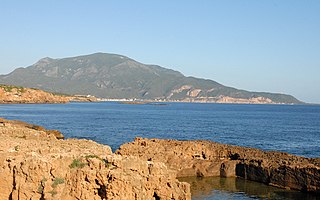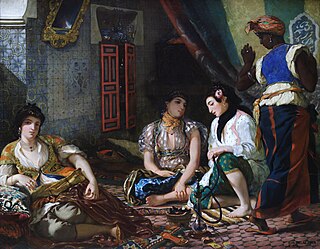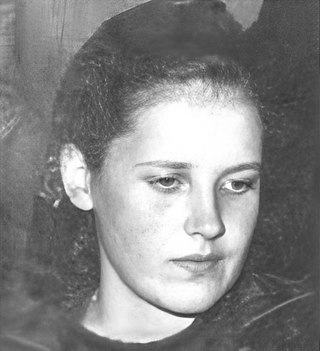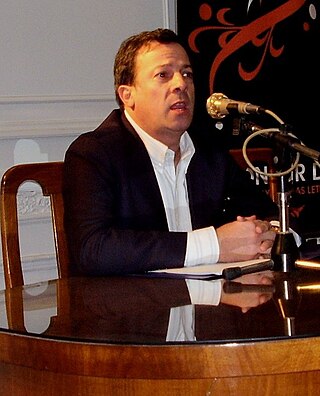
Mount Chenoua is a mountain range in northern Algeria. It is located between Cherchell and Tipaza on the Mediterranean coast, just west of Algiers. There are marble quarries on the side of the mountain.

Fatima-Zohra Imalayen, known by her pen name Assia Djebar, was an Algerian novelist, translator and filmmaker. Most of her works deal with obstacles faced by women, and she is noted for her feminist stance. She is "frequently associated with women's writing movements, her novels are clearly focused on the creation of a genealogy of Algerian women, and her political stance is virulently anti-patriarchal as much as it is anti-colonial." Djebar is considered to be one of North Africa's pre-eminent and most influential writers. She was elected to the Académie française on 16 June 2005, the first writer from the Maghreb to achieve such recognition. For the entire body of her work she was awarded the 1996 Neustadt International Prize for Literature. She was often named as a contender for the Nobel Prize for Literature.

Larbi Ben M'hidi, commonly known as Si Larbi or simply as Ben M'hidi, was a prominent Algerian revolutionary leader during the Algerian war of independence. He is one of the six founding members of the Front de Libération Nationale that launched an armed revolt throughout Algeria and issued a proclamation calling for a sovereign Algerian state.

Women of Algiers in their Apartment is the title of two oil on canvas paintings by the French Romantic painter Eugène Delacroix.
The University of Algiers, commonly called the Algiers 1 University or Benyoucef Benkhedda, is a public research university based in Algiers, Algeria. Founded in 1909 from the amalgamation of different institutions, it has become the oldest and most prestigious organised university in the country.

Leïla Sebbar is a French-Algerian author.

Algerian literature has been influenced by many cultures, including the ancient Romans, Arabs, French, Spanish, and Berbers. The dominant languages in Algerian literature are French and Arabic.

Danièle Minne was one of the few European women convicted of assisting the FLN during the Algerian War. Her mother Jacqueline Netter-Minne-Guerroudj and her stepfather Abdelkader Guerroudj, were both condemned to death as accomplices of Fernand Iveton, the only European who was guillotined for his part in the Algerian revolt. Her mother was never executed, partly due to a campaign on her behalf conducted by Simone de Beauvoir; her stepfather was also freed.

Carlos Alvarado-Larroucau is an Argentine-born French author.

Far from Medina is a 1991 novel by the Algerian writer Assia Djebar. The story revolves around a group of women contemporary with the Islamic prophet Muhammad. An English translation by Dorothy S. Blair was published through Quartet Books in 1994.

Malek Alloula (1937–2015) was an Algerian poet, writer, editor, and literary critic.

Eugénie Allix Luce (1804-1882) was a French educator, who founded the first French/Arab school for Muslim girls, the Luce Ben Aben School in Algiers, Algeria, in 1845.

Les Femmes d'Alger is a series of 15 paintings and numerous drawings by the Spanish artist Pablo Picasso. The series, created in 1954–1955, was inspired by Eugène Delacroix's 1834 painting The Women of Algiers in their Apartment. The series is one of several painted by Picasso in tribute to artists that he admired.
Louisette Ighilahriz is an Algerian writer, former Conseil de la Nation member, and a former member of the Front de Libération Nationale (FLN) who came to widespread attention in 2000 with her story of captivity by the French from 1957 to 1962, becoming, in the words of the American journalist Adam Shatz, "a catalyst of a debate about the legacy of the French-Algerian war".
The first Médéa expedition, also known as the Atlas expedition of 1830 was a military expedition conducted by the Kingdom of France against the remnants of the Deylik of Algiers, the Beylik of Titteri and the local resistance led by Mohamed ben Zaamoum. It began on 17 November 1830 and ended eight in early December.
Mirzaq Biqtash, Algerian writer and novelist. He published more than fifteen novels, translations, and short stories. His last work was the novel "The Rain Writers His Biography", which won the Assia Djebar Prize for Fiction in its third session, 2017. He died on 2 January 2021, at the age of 75.

La Nouba des femmes du Mont Chenoua is a 1979 Algerian documentary film directed by Assia Djebar. The film was the first of two films directed by Djebar during her decade-long hiatus from writing, produced outside of Algerian filmmaking circles.
Abassia Fodil was an Algerian regional secretary in Oran for the Algerian Communist Party and a prominent leader in the Algerian feminist movement. From 1943, until the organization was banned in 1954, Fodil was a leader in the Union des femmes d'Algérie. The organization primarily worked to alleviate socio-economic issues in the post-war period and supported anti-war efforts and Algerian independence. She served on the executive committee of the Women's International Democratic Federation and was part of the delegation of WIDF members who investigated war crimes in North Korea in 1951. She and her husband were assassinated in 1962.
Fantasia: An Algerian Cavalcade is a novel by Assia Djebar, published in 1985.













